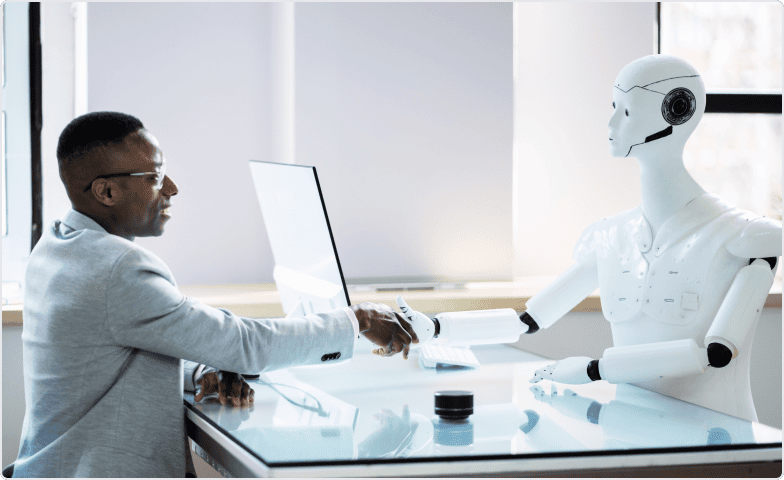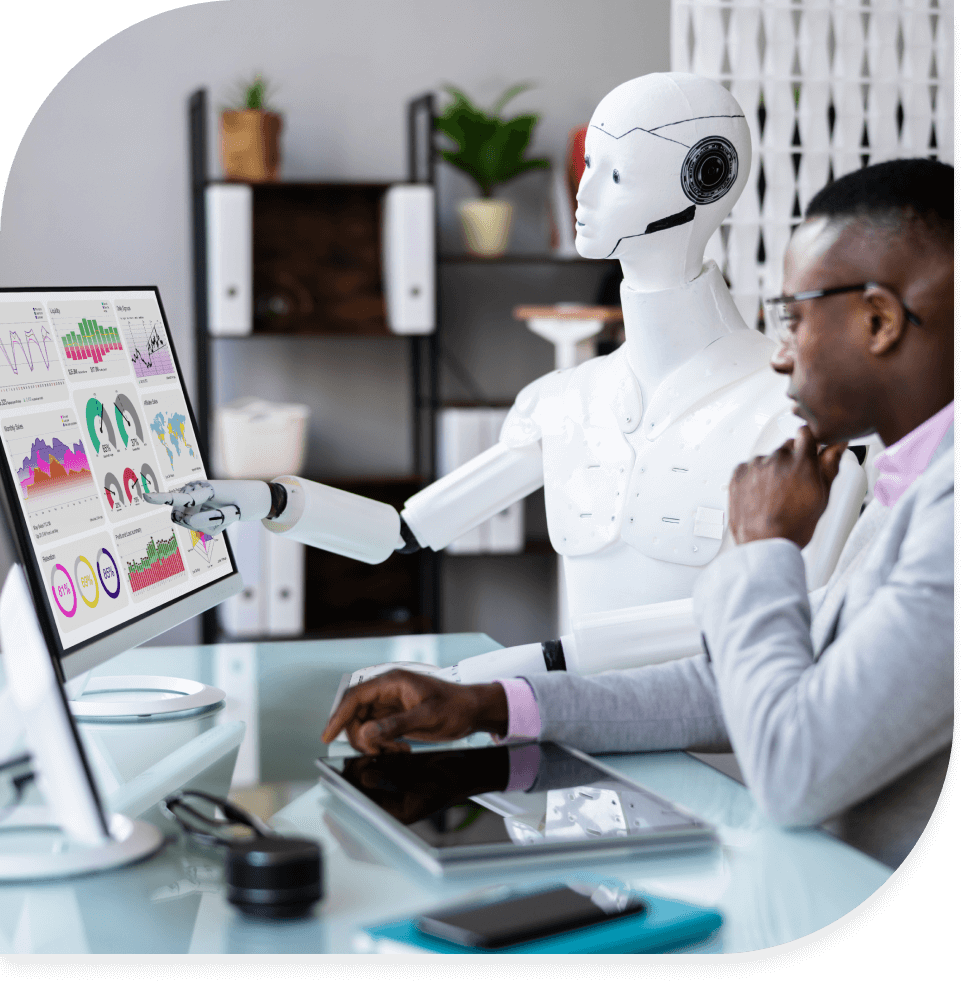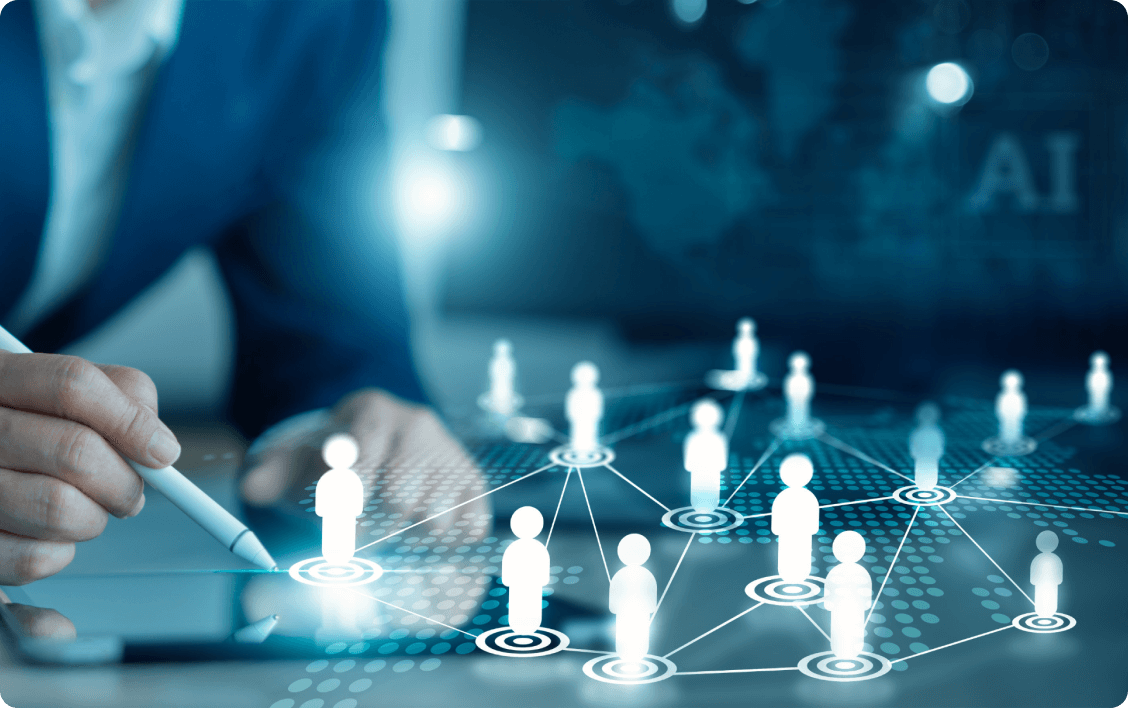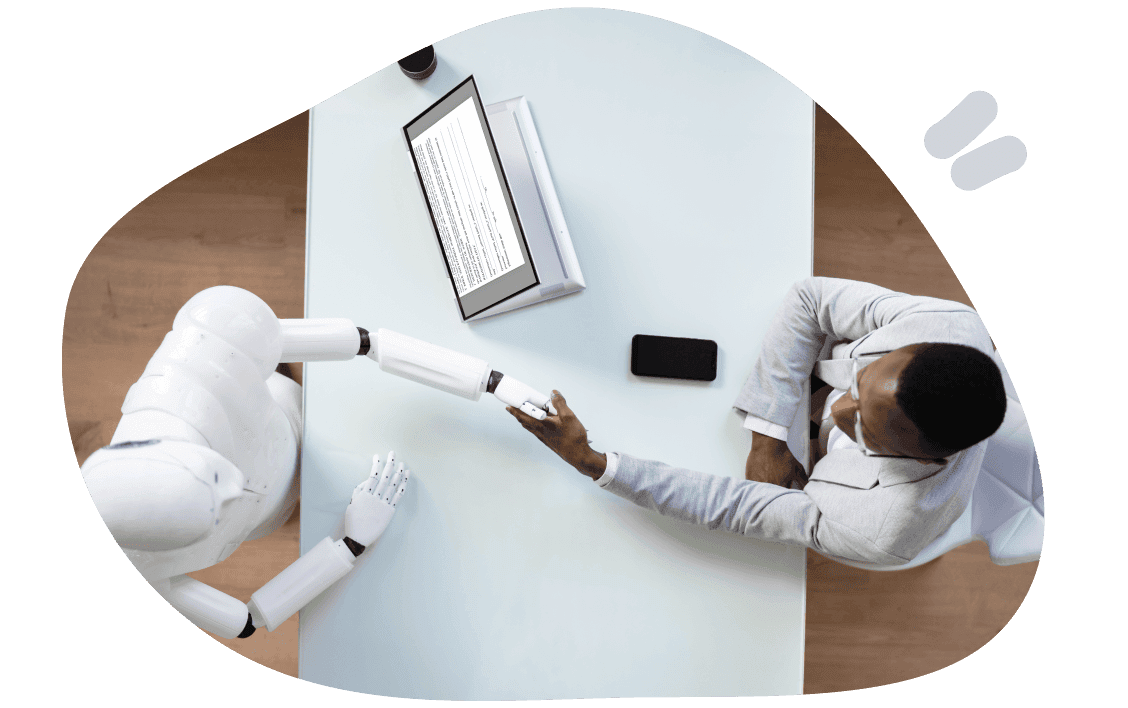
Role of AI in Recruiting
AI can recognize patterns, make decisions, and solve problems through data. Learn how AI automates repetitive tasks in seconds.

By 2030, AI in HR will be more than a trendy saying—it’ll become the new reality, especially for hiring. It’s estimated that employees will be spending 60-70% less time on administrative tasks with generative AI (GenAI). Through techniques such as generative modeling and machine learning, the future of recruitment technology is faster, smarter, and more equitable than ever before.
However, as with any emerging technology, AI comes with a unique set of challenges, risks, and responsibilities across any organization. It’s disruptive and has the potential to shift the way recruiters hire and train across the board. With the power of people analytics and clear hiring metrics, HR professionals can build better teams from the ground-up.
Powerful Effects of AI in Recruitment
With a strategic HR roadmap, organizations can put a plan in place to mitigate risk and promote a safer recruitment process. AI in HR promotes engagement from the moment an applicant views a job description to the end of the video interviewing process. The rippling effects of its impact and scalability on the speed of hiring is shifting the world of work forever.
Comparing AI Now to the Past
Learning and development trends now sophisticatedly integrate with AI. One of the first uses of AI in HR was with automated SMS. Organizations that were quick to jump on the AI train for their hiring goals saw higher ROIs, especially during the preliminary stages of the recruitment process.

Now that top talent lives anywhere in the world, HR teams are rapidly turning to AI to streamline operations, enhance decision-making, and improve the candidate experience. From recruitment to workforce planning, AI tools in HR can automate time-consuming tasks, such as coordinating meeting times.
With AI, recruiters can automate resume screening, match candidate profiles to job descriptions, and rank applicants based on their suitability. This significantly reduces the time HR teams spend on initial screening, which allows them to focus on and engage with top candidates.
AI can analyze employee sentiment through surveys, feedback, and social media monitoring to identify patterns in engagement levels. They help identify at-risk employees and fluctuations in morale. Through these insights, HR teams can implement timely interventions to improve retention and workplace satisfaction.

From new hires to senior managers, AI in HR can continually assess employee hard and soft skills, learning preferences, and career goals to create tailored development plans. This leads to more effective and customized training programs and continuous learning, which ensures employees grow within the company while championing strategic goals as a cohesive team.
Workforce planning involves data, statistical algorithms, talent intelligence, and machine learning techniques to predict future needs, trends, and outcomes. Organizations can then make more informed decisions regarding recruitment, staffing, training, and retention. The goal? To optimize HR strategies and align them with business objectives.
AI and HR systems are powerful. And to leverage them responsibly, organizations must promote ethical AI and make sure their digital system is designed and deployed in a way that promotes fairness, transparency, and equality—while minimizing biases and discrimination.

“Anything that involves emotional intelligence is unlikely to ever be replaced. But at the bottom end of the value pyramid – things are about replicating a process – will be automated.”

Jeremy Campbell
CCO of SD WorxSo, how can organizations manage the use of AI in the hiring process as the fourth industrial revolution (4IR) looms around the corner? They will need to keep interview compliance principles at the forefront of the process.

Will future recruiters become holograms? Might uber-intelligent robots replace hiring managers altogether? Expert work psychologists suggest that it’s highly unlikely. Emotional intelligence and nuanced decisions are still best handled by humans. Interview intelligence, which includes AI and ML, allows HR teams to have control over important recruitment decisions to avoid interviewer bias.
“As we design the employee experience, it's so important to decide when an activity should be done by a lovely warm human being, or when is better to automate it. Get this wrong and the impact on retention and productivity is massive.”

Andrew Spence
HR transformation director (Glass Bead Consulting)AI can sift through large volumes of applications, identify key skills, and rank candidates based on predefined criteria. Carefully monitored algorithms can also help HR teams forecast turnover rates, identify employees at risk of leaving, and predict the need for specific skill sets based on organizational performance and market trends.
However, HR is inherently about managing people, understanding their needs, and fostering genuine relationships. AI lacks the emotional nuance required for empathetic communication, conflict resolution, and complex decision-making. Hiring technology may also struggle to handle complicated, sensitive issues in the workplace and performance hiccups.
AI helps create a positive employee experience by significantly cutting down the hours spent on administrative tasks. This allows HR teams to focus on strategic initiatives and employee well-being. AI-driven chatbots can provide instant responses to HR queries, which reduces friction in processes like performance reviews, and onboarding. Also, AI tools can help personalize employee learning and development plans.
While AI has the potential to reduce bias, its ethical use in HR depends on how the technology is implemented. AI models need to be carefully trained to ensure they are not reinforcing existing biases. Organizations must be transparent in how AI in HR is used—especially with recruitment—to ensure employees and candidates understand how their data is being collected and analyzed. Implementing ethical AI in HR requires ongoing monitoring and adjustments to avoid unintended consequences.
AI can currently screen resumes, match candidates to job descriptions, and even conduct preliminary interviews. It helps HR teams understand employee satisfaction, retention risks, and performance trends. In the future, as these automated hiring tools become more sophisticated, they will serve a complementary role, as HR professionals will still be responsible for nuanced decisions and oversight of the recruitment process.
Modernize your hiring process with expert insights and advice.